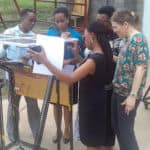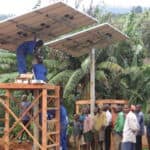Financing Off-Grid Solar: A Pioneering Provider in Honduras Shows the Impact of Diversified Funding
In December of 2020, as COVID-19 dominated global headlines, Brenda, a Honduran entrepreneur, decided to buy a new freezer for the village grocery store she operated from home.
Residents of Brenda’s community in the isolated region of Gracias a Dios are not served by the national electric utility. Lacking access to electricity, her old freezer was powered by a gasoline-fueled generator. But since gasoline supplies are limited and costly in such a remote location, she could only run her freezer for a few hours each day.
To eliminate her fuel expense and upgrade her business, she chose to invest in a solar-powered freezer. She could run the new freezer 24 hours per day, enabling her to offer a wider variety of foods with greater consistency and quality.
The benefit to Brenda’s customers and her business was so substantial that in November of 2021 she bought a second solar-powered freezer, then a third in October of 2023 and a fourth in March of 2025. She purchased each freezer from Soluz Honduras on an installment plan financed by the microlender Kiva.
With her fleet of solar-powered freezers operating 24/7, Brenda now sells meats, dairy, frozen treats and cold drinks that were formerly impossible to stock in her community.
The growth of Brenda’s business, and the added benefits that solar-powered freezers have brought to her village by enhancing local food security, were enabled not just by the maturation of solar photovoltaic (PV) technologies, but just as importantly by financial and business model innovations that are bringing off-grid solar systems and appliances to customers like her.
An Off-Grid Solar Pioneer Gains Traction in Rural Honduras
With a 2024 GDP of just US $3,426 per capita, Honduras ranks as the third-poorest country in the Latin America and Caribbean region, ahead of only Nicaragua and Haiti. In 2024, 39% of the total population were rural, and 64.1% of these rural households were categorized as very poor by world standards. The country has an electrification rate of 85.6% via the electricity grid operated by the national utility (ENEE), with many of the most remote regions unserved.
Although the government has aspirations to achieve universal electrification, this goal will be difficult to realize in the near term, given the fiscal constraints facing the country and the challenge of serving low-density, low-income populations in remote and mountainous regions.
In these isolated areas, where grid-based electricity is not yet available and obtaining it is a distant prospect, off-grid solar systems adapted to local needs can provide pre-grid electrification that greatly improves quality of life.
Enter award-winning company Soluz Honduras. Founded in 1994 by Richard Hansen, Soluz Honduras — a pioneer in the sector and a subsidiary of Soluz, Inc., founded the previous year — has been at the forefront of solar electrification in Honduras for over three decades. With a mission combining both commercial and social impact, and operations that extend to both urban and rural areas, the company sells solar PV-based systems through several financing models that make solar solutions accessible across Honduras.
Soluz has led the electrification of over 30,000 Honduran homes and businesses using solar solutions, reaching the remote mountain areas where the indigenous Misquito and Tolupán communities live, as well as the coastal Afro-Caribbean Garifuna indigenous communities. Its solutions include small (5W to 50W) standardized products from leading manufacturers such as Sun King that serve rural farmers’ basic low-power electricity needs (e.g., solar lanterns, cell-phone charging, radio), and also larger PV systems (80W to 1kW) that power appliances like freezers at higher-income households and enterprises.
Soluz has sold and financed hundreds of solar-powered freezers for fishermen and rural stores like Brenda’s across Honduras. During the COVID-19 pandemic, this product offering became vital for food preservation. According to Soluz Honduras’ General Manager, Paola Rodriguez, “We quickly responded to the need by supplying and financing dozens of solar-powered freezer systems for grocery shops in remote areas.”
These systems typically incorporate large (>400W) PV modules, Morningstar controllers, and well-proven Trojan deep-cycle batteries that can be recycled through the Honduran recycling center INVEMA at the end of their useful life. Many of these solar-powered freezers have been sold to women-owned rural stores, empowering female entrepreneurs by providing them with the tools to grow their businesses and improve food preservation in their communities.
Three Financing Models for Off-Grid Solar Solutions
When customers have sufficient funds or access to sources of financing, Soluz Honduras sells its solar solutions on a cash basis. However, many of its customers do not have the money or the access to lenders to pay a lump-sum payment to purchase solar solutions outright. Soluz uses a blend of three financial mechanisms to serve these customers, which include:
Microfinancing: Soluz Honduras has partnered with Kiva, a U.S.-based nonprofit that enables people to lend money via the internet to low-income families and entrepreneurs in underserved communities around the world. Since its founding in 2005, Kiva has raised over $2 billion from individuals who make loans of as little as $25 to borrowers across more than 75 countries.
This Kiva microfinancing offer is crucial for rural families who can’t afford upfront payments of the size required to purchase solar solutions outright, but who can manage small monthly installments. Payments are aligned with borrowers’ household or business cash flows: For instance, the solar-powered freezers Soluz sells to women entrepreneurs are financed over 12 to 24-month terms.
Via the Kiva partnership, Soluz has provided over $1.4 million in customer financing to Honduran customers. Crucially, the credit risk associated with the Kiva loans has consistently been low: In recent years, the loan default rate for Soluz’s customers has been less than 1%, far below the Kiva average of 1.78%.
“Pay-As-You-Go”: Soluz has decades of experience providing different payment options to customers, and in recent years it has expanded them to include Pay-As-You-Go (PAYG) solar kits.
PAYG-based solar solutions are commonly designed with metering technology embedded in the products: They deactivate when the credit associated with the customer’s last payment runs out, and are reactivated for another 30 days when customers enter a code given to them after making a monthly payment. PAYG thus ensures payment discipline, and the resulting low credit risk in turn is critical in enabling companies like Soluz to offer solar solutions at affordable monthly payment levels to customers who lack a credit history. Soluz is also exploring mobile money as a way to utilize PAYG technology more fully.
Results-Based Financing: Results-based financing (RBF) is an increasingly common approach in the philanthropic arena: Since the disbursement of funds happens only after the achievement of desired outcomes, donors receive greater assurance that their funding has produced the results they are seeking. While RBF is of limited utility for startups, it can be a valuable source of finance for mature companies like Soluz, which uses it as a source of blended finance with existing commercial investment into the company.
Soluz leverages RBF in its newest initiative, the Universal Access Program (UAP), which is specifically focused on bringing electricity to low-income families in the most isolated areas of the country. During the UAP’s 1,000-household pilot phase, completed in 2025, each $100 increment of RBF allowed Soluz to provide a $50 price discount to customers, and to reimburse itself for $50 worth of the logistical expenses associated with selling small 13W and 60W Sun King kits to customers in costly-to-reach remote areas.
To source its RBF contributions for the UAP, Soluz partnered with Let’s Share the Sun Foundation, a U.S.-based non-profit whose mission is to help provide solar solutions to families in underserved communities.
Expanding Off-Grid Solar Electrification Via Blended Finance
According to the International Energy Agency, about 750 million people worldwide still lack access to electricity (as of 2023), the majority in sub-Saharan Africa. While much of the current focus and funding in the global energy access sector involves large initiatives such as Mission 300 in sub-Saharan Africa, it remains critical to continue to support the work of small enterprises that are delivering energy solutions in underserved communities elsewhere in the world as well.
Across parts of Latin America and the Caribbean, there are still about 16 million people without access to electricity, and another 60 million with unreliable service. These numbers include an estimated 1.4 million people in Honduras. Even in a modest-sized market like Honduras — with an off-grid population residing in heavily mountainous rural areas that cover nearly 80% of the country, and a working environment subject to significant uncertainties — companies like Soluz can nonetheless serve off-grid rural customers sustainably.
A key to the continued success and growth of such businesses is expanded access to financing. As described above, a company’s ability to serve communities not yet reached by an electricity grid is greatly aided by a blended finance approach, integrating both commercial and concessional financing. Soluz’s experience shows that even the hardest-to-reach areas and the poorest of customers can be sustainably served using this approach. Its 30-year track record in the energy access sector speaks for itself.
International and local public and philanthropic funding, alongside other forms of impact investment where feasible, remains critical in enabling companies like Soluz and many others around the world to cover the increased costs of reaching remote locations. Often, this funding must be tailored to the specific needs and challenges within the local marketplace facing both customers and businesses, such as customer geographic isolation and/or sparse population, lack of customer credit history, low incomes and long supply chain lead times.
As we look towards 2030 as the end point of the current Sustainable Development Goals, with universal energy access enshrined in SDG7, time is running short. Partnerships between for-profit companies and non-profit organizations and philanthropies can continue to accelerate the global spread of energy access via off-grid solar solutions, helping to reach underserved communities and drive both social and economic benefit. With access to blended finance and other forms of sustainable and flexible funding, small businesses like Soluz in Honduras and others in developing economies around the world stand poised to enhance their ability to offer products that can dramatically improve customers’ lives and increase the economic and social vitality of their communities.
Richenda Van Leeuwen is President of Hummingbird Green Solutions; Richard Stuebi is a Non-Resident Senior Fellow at the Mehrotra Institute of Business, Markets and Society at the Questrom School of Business at Boston University; Jesse Colman is pursuing an MBA at Boston University.
Photo credit: Soluz Honduras



